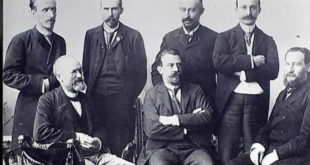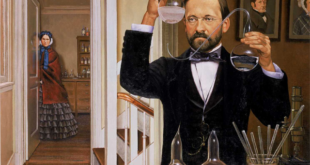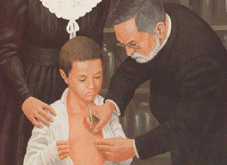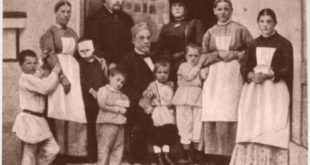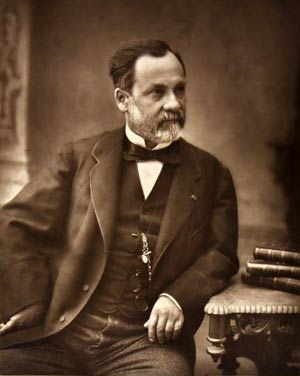
Many have attacked Louis Pasteur as a man who denied God’s existence and others have gone as far to say he was a devout Catholic his whole life. In my humble opinion, he was somewhere in between.Pasteur was a spiritual man and recognized the need for religion, as many times he would rely on faith alone to keep his work going. He trusted that the universe was ordered and organized efficiently and that if he continued to pour his heart into his work, his efforts would not fail him. Because of this, he did not rely on religion and religious dogma to guide his beliefs. He was a man of his work and the work ultimately defined the man. But Pasteur did not hide from religion. In a letter to to his sisters as a young man he wrote:
If by chance you falter on the journey, a hand will be there to support you. If that should be wanting, God, who alone would take the hand from you, would accomplish the work.
And near the end of his life, in his seventy-third year Pasteur spoke of the end of his journey and how it came to him “in an absolute faith in God and Eternity,” and with a conviction that the good given us in this world will be continued here-after.
Spontaneous Generation: The Origin of Life
Much has been said regarding the origin of life and I dare not enter into that discussion. Pasteur rarely, if at all, spoke of religion explicitly. He tended to generalize the subject, but with the debate around the theory of spontaneous generation, Pasteur was forced to address it. Pasteur could not deny that he didn’t understand the origin of life, but only insisted that life comes from life, not from non-life or simple chemical reactions, as spontaneous generation would suggest. So, Pasteur never negated the possibility of life beginning from divine creation, only that the discussion and discoveries at hand were a matter of science. Debré describes Pasteur by saying that, “his attitude was that of a believer, not of a sectarian,” and that Pasteur was, “A biologist more than a chemist, a spiritual more than a religious man, Pasteur was held back only by the lack of more powerful technical means and therefore had to limit himself to identifying germs and explaining their generation.”
Pasteur also spoke of his doubts regarding the creation of the universe:
The idea of God is a form of the idea of the Infinite. As long as the mystery of the Infinite weighs on human thought, temples will be erected for the worship of the Infinite, whether God be called ‘Brahma,’ ‘Allah,’ ‘Jehovah,’ or ‘Jesus’; and on the pavement of those temples men will be seen kneeling, prostrate, annihilated, in the thought of the Infinite. At these supreme moments there is something in the depths of our souls which tells us that the world may be more than a mere continuation of phenomena proper to a mechanical equilibrium brought out of the chaos of the elements through the gradual action of the forces of matter.
Experimental Science: Pasteur’s Religion
More than anything Pasteur believed in experimental science. As he said himself, “Experimental science is essentially positivist in the sense that in its conceptions it never concerns itself with the essence of things, the origin of the world or its final destiny.” Pasteur of course was a product of 19th century Europe and unmistakably was effected by the beliefs of the Enlightenment. However, unlike many others, Pasteur asserted the preeminence of hypotheses over religious or metaphysical prejudices and always seemed willing to abandon theories that were outdated or useless in practicality. Pasteur often saw religion as a hindrance to scientific progress. In 1874, presiding over the award ceremony at the Collège of Arbois, he clearly stated his position:
I know that the word free thinker is written somewhere within our walls as a challenge and an affront. Do you know what most of the free thinkers want? Some want the freedom not to think at all and to be fettered by ignorance; others want the freedom to think badly; and others still, the freedom to be dominated by what is suggested to them by instinct and to despise all authority and all tradition. Freedom of thought in the Cartesian sense, freedom to work hard, freedom to pursue research, the right to arrive at such truth as is accessible to evidence and to conform one’s conduct to these exigencies–oh! let us vow a cult to this freedom; for this is what has created modern society in its highest and most fruitful aspects.
Pasteur had great respect for the unknown and the infinite, but did not allow himself to become a victim of superstition and fanatical religious explanations. As his work displays, Pasteur believed that the human mind was capable of making discoveries and clearly identifying causes, even of the unseen or “invisible” world. His work in chemistry and microbiology proved that, through applying scientific principles to industry and commercial processes, mankind could rise above disease and poverty. This ideology in many ways contradicted the Catholic Church, which, meanwhile was teaching the indigenous peoples of the new American colonies that “poverty and suffering are signs of true Christians.”
Louis Pasteur did not deny religion, but was compelled to say that, “religion has no more place in science than science has in religion.” The role of religion in his mind was clear:
In each one of us there are two men, the scientist and the man of faith or of doubt. These two spheres are separate, and woe to those who want to make them encroach upon one another in the present state of our knowledge!
 Pasteur Brewing Louis Pasteur – Science, Health, and Brewing
Pasteur Brewing Louis Pasteur – Science, Health, and Brewing 